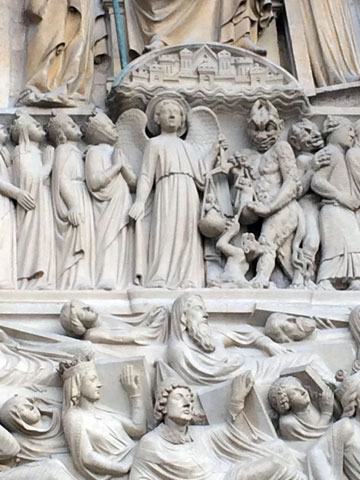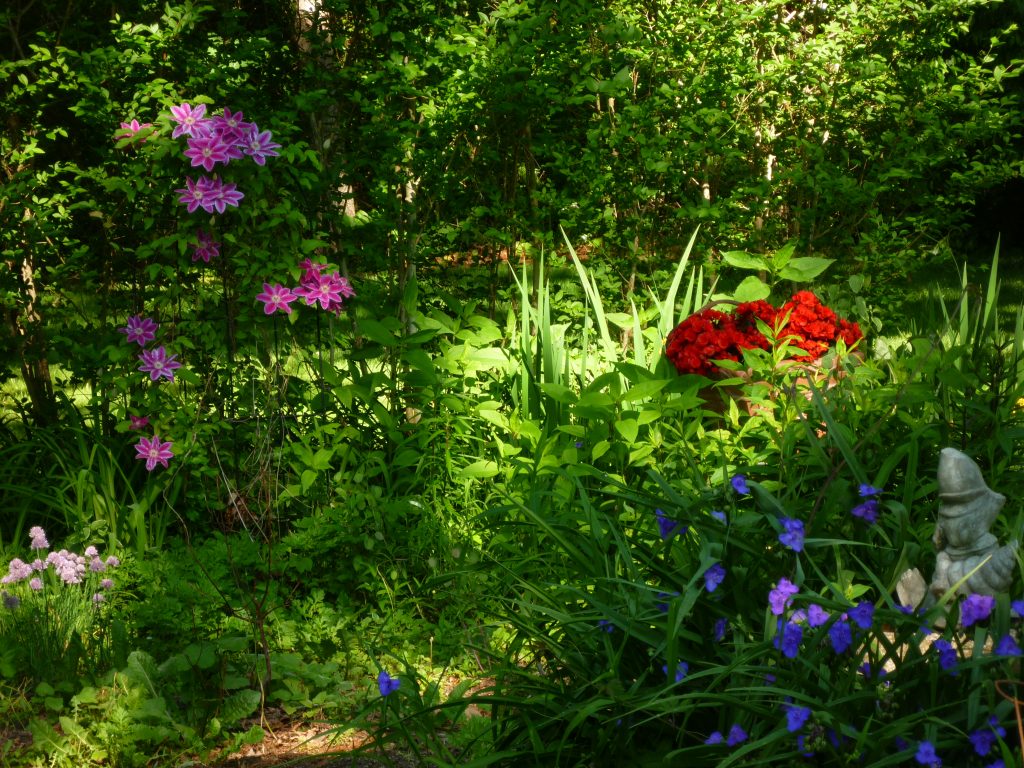Posted on July 22, 2019
Zen and Western Culture

St. Michael weighs souls at the Portal of Judgment, Notre Dame Cathedral.
Like oil and water, Zen and Western Culture don’t mix. Western spirituality is usually colored by Occidental mythology and the religious traditions of Judaism, Christianity and Islam. In exploring Eastern philosophies and religion, a person brought up in a Western culture, is disadvantaged. The practices and basic tenets of patriarchal monotheism are much different than those of the Eastern religions, and that can prove to be a stumbling block to those who attempt to take up the traditions of the East. Practices such as praying and penance, concepts such as heaven, hell and sin are not really part of the canon common to Zen and Taoism. People drawn to the East, at times, unconsciously, mix Western traditions into their understanding of Zen and the Tao.
Translation
Here the Chinese characters represent the term Western Culture. The characters do not translate to letters. It’s a different alphabet with a different way of visually representing language. Likewise, care must be taken to be mindfull of the mutually exclusive terms in both Zen and Western culture. Substituting Western words for Eastern concepts can sometimes alter the true meaning of that which is to be transmitted.
A quote attributed to Thich Nhat Hanh, posted on line, stated: “In the spirit of Buddhism, anything you do that is accompanied with mindfulness, concentration, and insight can be considered a prayer.” I’m sorry. I see mindfulness as observation. I see prayer as desire.
Merriam Webster’s definition of the word prayer: an address (such as a petition) to God or a god in word or thought.
O.E.D. definition: A solemn request to God, a god, or other object of worship; a supplication or thanksgiving addressed to God or a god.
You can argue that this definition wasn’t what was intended in the Thich Nhat Hanh quote but by definition this is what it means.
I’m sure the word prayer was used with good intentions but care needs to be taken when using Western terms to convey Eastern concepts. Instances such as this, sew confusion and send people (literally) down the wrong path. Both definitions use the word god. The Buddha was not a god. He was a man, enlightened to the oneness that is existence. In Eastern thought, to realize your true nature is to awaken to the underlying common thread of all existence, it has nothing to do with your soul seeking heaven.
Posted on July 14, 2019
Zen Newcomer Sees It as an Insider’s Game

Searching for your true nature
The other day, I read a Facebook comment from a Zen newcomer. The basic idea was that Zen is an insider’s game of haves and have-nots. The suggestion was that those in the group, those that are the seekers of enlightenment, are some kind of snobs. The complaint was pretty direct. “Of course you know what this is all about, you people have been studying this for years” Believing that those who have been around for years, look down on those who don’t get it. The person posting the comment seemed to think that this Zen employs some kind of hazing ritual, taunting the newbies with enigmatic terms such as non-attachment and detachment, mind and no-mind, illusion and delusion. Sometimes that’s true and sometimes the uninitiated is way too far outside to grasp what is going on.
The Zen Newcomer
Obviously, one looking for some kind of spiritual experience would come to a Zen forum or Zen Facebook group or ashram with a preconceived concept of what it is they are seeking. Aside from the desired end result, they bring with them a vague notion of what they will need to do, to achieve their goal. This is where frustration sets in for a Zen newcomer. The “if…then” mindset doesn’t work in Zen. If I work real hard, then I will attain my goal… doesn’t really apply. This is not a test. You can not find your nature, if it is your true nature you seek, it’s already there. It’s like searching everywhere for your keys and then realizing they were in your pocket all the time.
If you wish to realize your nature, my advice would be to work on peeling back that, which obscures it. Do you identify with your past experiences? Is that who you are? Suchness is the thing that we all share. Everyone has different experiences, so obviously your nature is something other than your history. The same goes for your biology. Your DNA makes you a unique individual, physically we are all different. So, what is that common thread we share with the rest of reality?
Years ago I saw the Andrew Wyeth exhibit at the Philadelphia museum. His time spent on the Kuerner farm produced a painting entitled “Ground Hog Day”. The painting was of a table set for Karl Kuerner — plate, knife and cup waiting — without Mr Kuerner in the picture. Accompanying the painting was a quote from Wyeth, “I wanted to get down to the very essence of the man who wasn’t there.”, one of my favorite Zen quotes of all time.
Posted on July 7, 2019
Zen of Working in the Yard
I just finished an article in the Washington Post about how spending two hours a week in “green space” adds to your life expectancy. Another piece spoke about the “sober curious” movement among mothers. For some reason things that seem normal and logical become revelations in today’s society. Living your life is actually good for you and avoiding life puts a strain on your well being. Go figure. Moving about is good, sitting around isn’t so good. Eating real food is good, processed food, not so good. Drinking water good, soda and sugary drinks… well you get the idea. There is a great opportunity to practice mindfulness… the zen of working in the yard.

Flowers growing in the garden
I get comments from neighbors about how nice my yard looks and frankly, I find it embarrassing. The last thing I care about is what the neighbors think of my lawn. Somewhere along the way, I’ve written about how I see my yard as one big Bonsai tree. I use it as a way to be part of what surrounds me. Hiring someone to take care of the lawn would separate me from an experience that I find gratifying. There’s the physical experience of the work, there is transcendence in being involved with nature and, when it’s all done there is an aesthetic element of viewing what I have done.
There is a certain truth of the nature of things that emanates from a job well done, whether it’s a painting or, a symphony, a brick wall or, my new mown lawn. I do not sit in the Zen sense of the word. I am not a meditator. But mindfulness…I mow my lawn and cook my dinner and, I literally chop wood and carry water.
Posted on June 11, 2019
The Thinker and the Self
There is much said about the search for self. The harder you look, the more elusive the self becomes.
My affinity with Zen is based on its ability to adhere to scientific evidence. The duality of a “me”, separate from the rest of everything else, is not based on anything tangible. It is all based on perception. “I think, therefore I am”. Descartes’ notion is that even if all we experience is illusion, then there must be a “me” who is being deluded. Thoughts infer a thinker. But do they?
What we really are, just like any other organism, is a series of stimuli and responses. We possess a complex brain to monitor and respond to stimuli and as Max Tegmark says in Closer to Truth, consciousness is what we feel when the brain considers complex functions. True to Zen philosophy, the brain deals with the now. It’s controlling our breathing and regulating the heart beat. The brain works to recall past experiences and detects patterns such as the cyclical nature of the day or the seasons. We can use this to help predict what might happen. But while all the whirring and churning of the brain is going on, the brain’s primary function is to focus on the here and now. For, it is the here and now that embodies the past and anticipates the future. The now, is forever.
Posted on May 29, 2019
Standing in a Puddle
Words have consequences. When dealing with concepts it is important to get the terminology correct. I have been stuck on the word “realize”. Reading posts on consciousness, and zen, and even delving into the science of the brain, the word “realize” is the word that resonates. Everything we need is already here. There are no questions to answer. There are no concepts to understand. There is no path to seek. All you need to do is realize.

Realize. A simple Google search for the word helps to clarify: The first definition of realize contains the phrase “become fully aware of”. The second definition: “cause (something desired or anticipated) to happen”, contains the word cause. I don’t think you can cause realization. It’s probably where I disagree with some people’s understanding of practice. I don’t see how you cause a revelation when what you’re looking for is right there. Your feet feel wet, and then you realize you’re standing in a puddle. The wetness you felt brought on the realization, not any action you consciously took. You were unaware you were standing in a puddle, until you felt your feet getting wet, which leads to another Zen word – awareness.


 Follow
Follow